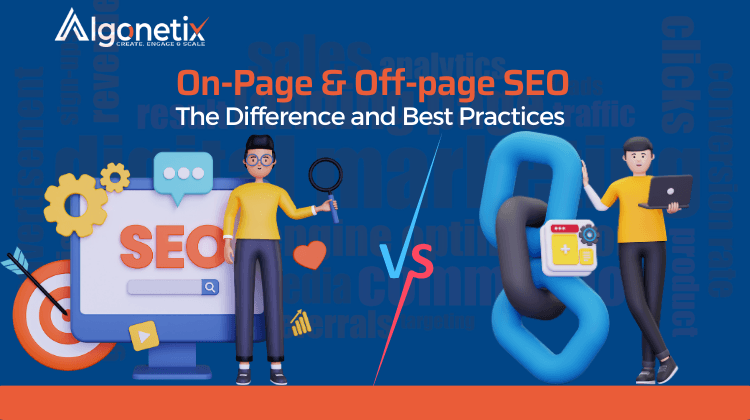
Search Engine Optimization is the way to enhance website visibility and drive potential traffic. Basically, there are two different areas for SEO: On-page SEO and Off-page SEO. Understanding the differences between the two can help a person apply best practices to improve the performance of a website.
Differences Between On-Page and Off-page SEO
What is On-page SEO?
On-page SEO is the process of changing things on your website to improve your search rankings, such as content quality, HTML code, or even site structure. Proper on-page SEO ensures that your website is easily crawled and understood by search engines.
What is Off-page SEO?
Off-page SEO is everything outside your own website that you do to be able to affect rankings on SERPs. In simpler words, it has to do with making a site more authoritative through external means, such as getting backlinks and social signals.
Differences Between On-Page and Off-page SEO
On-page and off-page SEO have their significant differences. Needless to say, they are still both important if you want your site to achieve good visibility across search engines. On-page SEO edits the elements within the web pages to ensure your website can be spotted by search engines as a relevant authority in a certain niche. Meanwhile, off-page SEO adds to your visibility by building links and signals outside of your page or website to ensure that higher rankings can bring traffic to your brand.
So now, let us explore the key differences that these two types of SEO hold:
- Control
- On-page SEO: You have complete control over internal website elements such as content, meta tags, and header tags.
- Off-page SEO: You have limited control as it involves external factors like other websites linking to yours.
- Focus
On-page SEO: Concentrates on enhancing the internal aspects of your website for better search engine visibility.
Off-page SEO: Aims to build your website’s authority and credibility through external efforts and interactions.
- Techniques
- On-page SEO: Techniques include keyword optimization, meta descriptions, and content quality improvements.
- Off-page SEO: Techniques involve link building, social media marketing, and influencer outreach.
Best Practices for On-page SEO
These are the best practices for on-page SEO:
Optimize Keywords and Content
It involves detailed keyword research on terms most relevant to your audience. Google Keyword Planner and SEMrush are high-end services used to find high-traffic keywords with low competition. Your goal is to flow naturally, adding value to readers while strategically putting keywords in a manner that gives real value. Keep refreshing your content so that it is updated and relevant. In so doing, it will continue to suit the needs of your audience and search algorithms.
Craft Title Tags, Meta Descriptions and Header Tags
Write descriptive title tags, including meta descriptions with primary keywords that are relevant to the page’s content and interesting enough to prompt clicks from search results.
Organize your content properly with header tags—H1, H2, H3. Use H1 tags that have a main target keyword and clearly spell out what the topic of the page is. Break down content with H2 and H3 tags into manageable sections.
Improve Content Quality
Write very high-quality, clear, informative, and engaging content. The content has to be relevant, comprehensively satisfies the requirements, and answers all questions that may arise in the minds of your targeted readers while, at the same time, naturally integrating the keywords. Update consistently to keep the content fresh and relevant.
Enhance Internal Linking
Link internally to other pages on your site that are relevant to the topic at hand. This aids in navigation and might keep users longer on your website. Internal links will also help search engines gain more context about your site and can improve the ranking for the pages you link to.
Optimize Images
Optimize your images by giving them descriptive file names and alt texts. Doing this will compress them to load faster, improving the user experience. Well-optimized images could also help improve your site’s search engine ranking.
Best Practices for Off-page SEO
These are the best practices for off-page SEO:
Build Quality Backlinks
Get links from high authority websites that are relevant to your industry. Quality backlinks inform search engines that your site is trustworthy and authoritative. High-quality links are from leading industry blogs, news sites, and academic journals that can help in ranking your website.
Write Guest Blog Posts
Write quality guest posts to be placed on other respected blogs within your niche. This is not only providing you with a few nice backlinks, but it’s also placing your brand before new audiences. Make sure that this guest post is relevant and of high quality for targeting audiences.
Engage on Social Media
Share your great content on social media to get it in front of your audience. This can be an easy way to drive visitors back to your site by sharing links from your blog posts, infographics, and videos. Engage your target market through comments, like buttons, and sharing to show them that you are one with them, thus earning more loyalty and higher credibility for your brand. Join industry conversations on social media and make a live appearance, and collaborate with influencers.
Collaborate with Influencers
Partner with influencers within your niche to extend your reach and support the building of credibility. Influencers will help you promote your content and create high-quality backlinks for you, thereby increasing your site’s authority and its online visibility.
List in Online Directories
Ensure that your business is listed in respectable online directories. A consistent name, address, and phone number (NAP) across all directories help search engines verify that a business is authentic and improvise ranking for location-based searches.
Conclusion
Master not only on-page but also off-page SEO to promote your website by driving relevant traffic. If you need professional help in doing so, reach out to Algonetix Technologies. We will help you practice and succeed in SEO in the long run, keeping your business always one step ahead of competitors.


